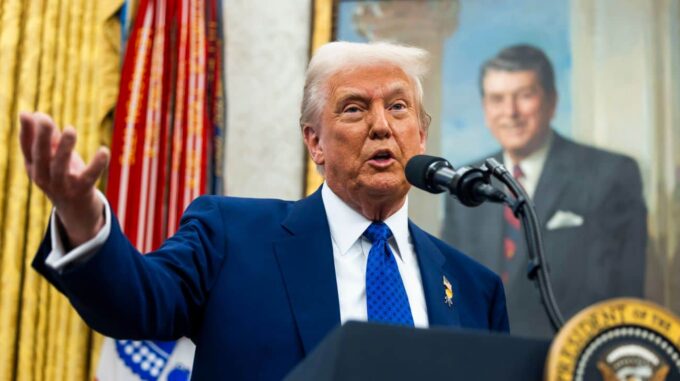Donald Trump claims that the trade tariffs he has implemented will make the United States “extremely wealthy

" U.S. President Donald Trump confidently states that his trade policies, including the imposition of high tariffs, will significantly strengthen the country's economy and make the U.S. "very rich." In interviews and speeches summing up his second term in office, he emphasizes that many important successes have already been achieved in this area. Trump is convinced that new tariff measures can generate substantial revenue for the country and pave the way for stable economic growth. Discussing achievements and plans, he noted that among the main accomplishments are the introduction of 25 percent tariffs against Canada and Mexico, the two largest trading partners. According to Trump, this was a necessary step in response to what his opponents call insufficient efforts by neighboring countries to combat illegal drug imports and illegal migration. He also pointed out that these measures, in his view, will help reduce the illegal flow of goods and bolster the internal prestige of the United States' trade policy. Trump emphasizes that his administration is actively working on further economic reforms and is already preparing a new package of tax cuts, which he described as a "huge, wonderful deal." These measures are expected to further reduce the tax burden on American citizens and businesses, as well as decrease the national debt through increased tariff revenues. The president also highlighted that the recent 10-percent tariff on most imports will act as a catalyst for accelerating reforms in foreign trade. Another key aspect of their policy is the introduction of higher tariffs for certain countries; for example, China is currently subject to a 145 percent tariff. Trump states that this is necessary to protect domestic producers and stimulate local manufacturing. At the same time, not everyone in the mainstream supports these tariff measures. On April 24, a coalition of 12 U.S. states filed a lawsuit against the Trump administration, claiming that the implemented tariffs are "illegal" and violate the country's trade laws. They argue that the administration is breaching the principles of free trade and creating artificial barriers to international commerce. Despite criticism and legal challenges, Trump continues to insist on the correctness of his policies and is confident in his strategy, which he believes can position the U.S. as a leader in the global economy. In his speech, he added that he hopes for the support of his fellow citizens, who will see long-term benefits in his reforms: lower taxes, increased incomes, and preserved jobs. According to the U.S. president, all economic policies are aimed at achieving financial independence for the country, improving citizens' well-being, and strengthening the U.S.'s position on the world stage. However, many experts point out that such measures could have side effects, including raising prices for consumers and triggering trade conflicts. Time will tell what their long-term effectiveness will be and whether society will truly become richer due to these tariffs. It should be noted that Trump's decisions regarding trade policy and economic sanctions remain subjects of debate and internal political crisis, as many states and business groups do not support implementing such measures in their current form. Court cases and international criticism only complicate the situation, casting doubt on its long-term stability and effectiveness.

